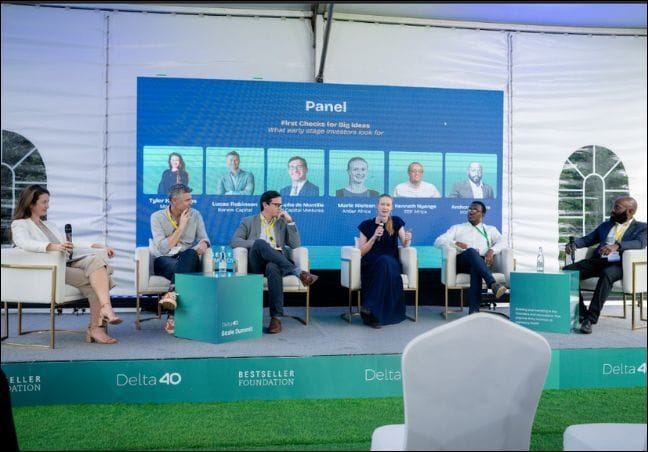- Circular Rising
- Posts
- What early-stage investors look for in circular founders
What early-stage investors look for in circular founders

From the newsletter
With access to capital still a major hurdle for startups in Africa’s circular economy, investors at the Delta40 Bestseller Foundation Circular Economy Scale Summit in Nairobi outlined what they look for when evaluating founders. These include expertise, strong teams and a clear understanding of the problem their innovations seek to solve.
Expertise emerged as a key quality, highlighted by investors as a major determinant of whether founders can successfully navigate challenges and build scalable circular economy ventures.
The investors believe that if these gaps are addressed, founders would be better positioned to inspire investor confidence and attract funding.
More details
Contributing to the panel, First Checks for Big Ideas - What Early Stage Investors Look For, Marie Nielsen, Partner at Antler Africa, highlighted that founder expertise is often a reliable predictor of early success. “Eighty-five percent of well-performing founders have domain expertise in their area,” she explained, contrasting it with failed ventures where that expertise was missing.
“We have become overly obsessed now around finding founders that have some prior experience. It can be in anything, as we are sector agnostic, but really founders that want to utilise that experience to build something which has a high chance of being successful,” Ms Nielsen said on the influence of the founder's prior experience on Antler’s investment decisions.
Besides expertise, Antler also focuses on the pace of execution, which Ms Nielsen described as “what founders are able to do between the starting point, coming in as yourself, and then what are you walking out with.” She cited cases where entrepreneurs entered Antler’s programme with little more than an idea but left with a clear pitch, early customers, or even initial revenues. “It boils down to being the right founders for what they are building,” she noted during the October 1-2 event in Nairobi.
Her views on founder expertise were echoed by Christophe de Montille, Principal at Beyond Capital Ventures who emphasised the need for relevant experience among founders. “We do want to see several elements of expertise. Do you have subject matter expertise in what you’re actually developing? And if you don’t, do you have someone that has that?” he said. Mr de Montille also emphasised the importance of team composition, cautioning that solo founders may struggle under the weight of early-stage demands. “It’s not that solo founders can’t succeed,” he clarified, “but we look for people who can share the burden even at an earlier stage, because it’s a lot.”
For Anthony Mahira, Investment Manager at DOB Equity, founders’ understanding of the problems they aim to solve is a key area of focus for Netherlands-based company that invests in innovative, scalable companies in Eastern Africa. Too often, he argued, entrepreneurs oversimplify entrenched systems. “We find it impressive when founders can clearly articulate why incumbents exist and then explain how they plan to address the systemic disadvantages they typically face,” he said. Such realism, Mr Mahira noted, shapes stronger outcomes which boost investor confidence in a startup’s ability to scale.
Investors also value founders who are willing to take risks alongside them, says Kenneth Nyange, Portfolio Manager at EEP Africa. “You find entrepreneurs who are about to start, but they don’t want to invest in their own business. They want somebody else to take the entire risk,” he said. Mr Nyange clarified that such investments do not always have to be financial but they could also be time, effort or mobilising support for the initiative. “That really counts quite a lot,” he stressed.
The investors were part of the participants in the two-day Circular Economy Scale Summit organised by Delta40, an Africa-based venture studio and VC fund and Denmark-based Bestseller Foundation, which invests in innovative, fast-growing ventures that generate social and financial returns in various areas including Africa. The invite-only Summit brought together a curated group of leading entrepreneurs, investors, corporates and policymakers in Africa's circular transition. It was designed to accelerate the circular economy across Africa's most vital sectors, driving economic transformation and regenerative impact.
The Summit also featured several philanthropic organisations, including the Bestseller Foundation, the DOEN Foundation, the Draper Richards Kaplan (DRK) Foundation and the Shell Foundation, which explored how philanthropic capital can de-risk and accelerate early-stage circular innovations, paving the way for commercial investment.
For Line Boss, Impact Director at the Bestseller Foundation, which co-hosted the event, the Summit was a “good platform for collaboration and learning.” The Foundation supported 15 circular economy founders in the early stages of their ideas through a six-month innovation programme hosted by Delta40. “Many of these entrepreneurs are not yet ready for investment. They need help to finalise their ideas, develop their products and find the right team,” she said in an interview with Circular Rising.
“We need to create a circular innovation ecosystem that is really thriving here in Africa,” said Lyndsay Holley Handler, Co-Founder and Managing Partner of Delta40, in her Summit opening remarks. “I believe the circular economy is not a sector; it’s a product or business model that cuts across all sectors.”
Our take
Open conversations are instrumental in helping African circular economy entrepreneurs navigate the challenging dynamics of building startups.
Africa’s circular economy remains constrained by a fragmented ecosystem. Beyond funding, progress will depend on creating hubs where founders and other stakeholders can co-develop solutions, test pilots, and translate individual innovations into systemic change.
However, long-term impact will require more than capital. It demands a cultural shift that prioritises patient investment and collaborative networks to help ventures grow from local experiments into continent-wide solutions.